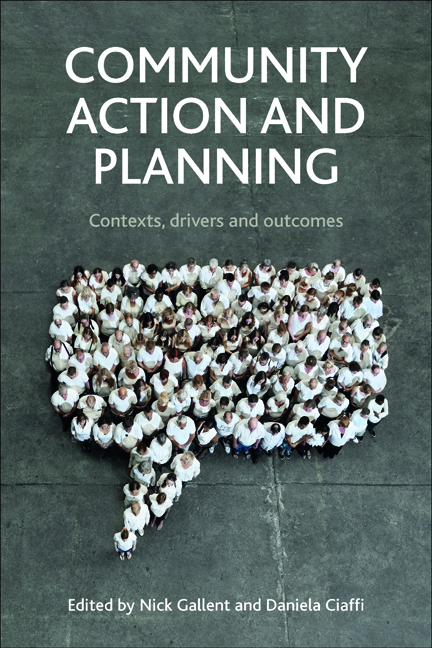17 - Reflections on community action and planning
Published online by Cambridge University Press: 04 March 2022
Summary
Introduction
We have sought in this book to sequence community action and planning; to show how it begins, the stages of its progression, and its outcomes for communities themselves and for the broader policymaking environment. In the first chapter, the capacities and values of socio-spatial communities were connected to their tendency to mobilise, to take action against everyday challenges, and in some instances to plan for their future wellbeing. The discussions of ‘foundational’ ideas that then followed, in the second and third chapters, emphasised the importance of social capital as a framing idea, and also the argument – often contested – that through dialogue different actors can find clear paths through conflict and be guided by a ‘collaborative rationality’. There was clearly a great deal of idealism in the opening chapter, and also an element of proposed linearity. Much of that idealism is stripped away by Rydin in Chapter 2 who argues that communities may come together for a range of positive or negative reasons, and in Chapter 3 (and again in Chapter 14), the simple linearity of community planning and of collaborative action is broken down and found to be lacking in many respects. The reality is that community action and planning can be conceptualised in a number of different ways. The contributors to this book have applied a range of perspectives: the idea of social capital has proved useful for some, but not all; collaborative and deliberative planning have offered some authors a way in to this area, but others see critical limits in the extent to which collaborative rationality explains changing power relationships in situations of apparently ‘networked’ governance.
Different perspectives have brought different insights, but analyses have also been coloured by the particular experiences of specific places and what community action appears to have delivered on the ground, relative to local constraints within each case study. Some of the contributors have clearly been more optimistic than others, seeing huge opportunities for an extension of such action in the years ahead. Others are more reticent, arguing that social fractures and state centrism will continue to limit what can be achieved within neighbourhoods.
- Type
- Chapter
- Information
- Community Action and PlanningContexts, Drivers and Outcomes, pp. 323 - 334Publisher: Bristol University PressPrint publication year: 2014



